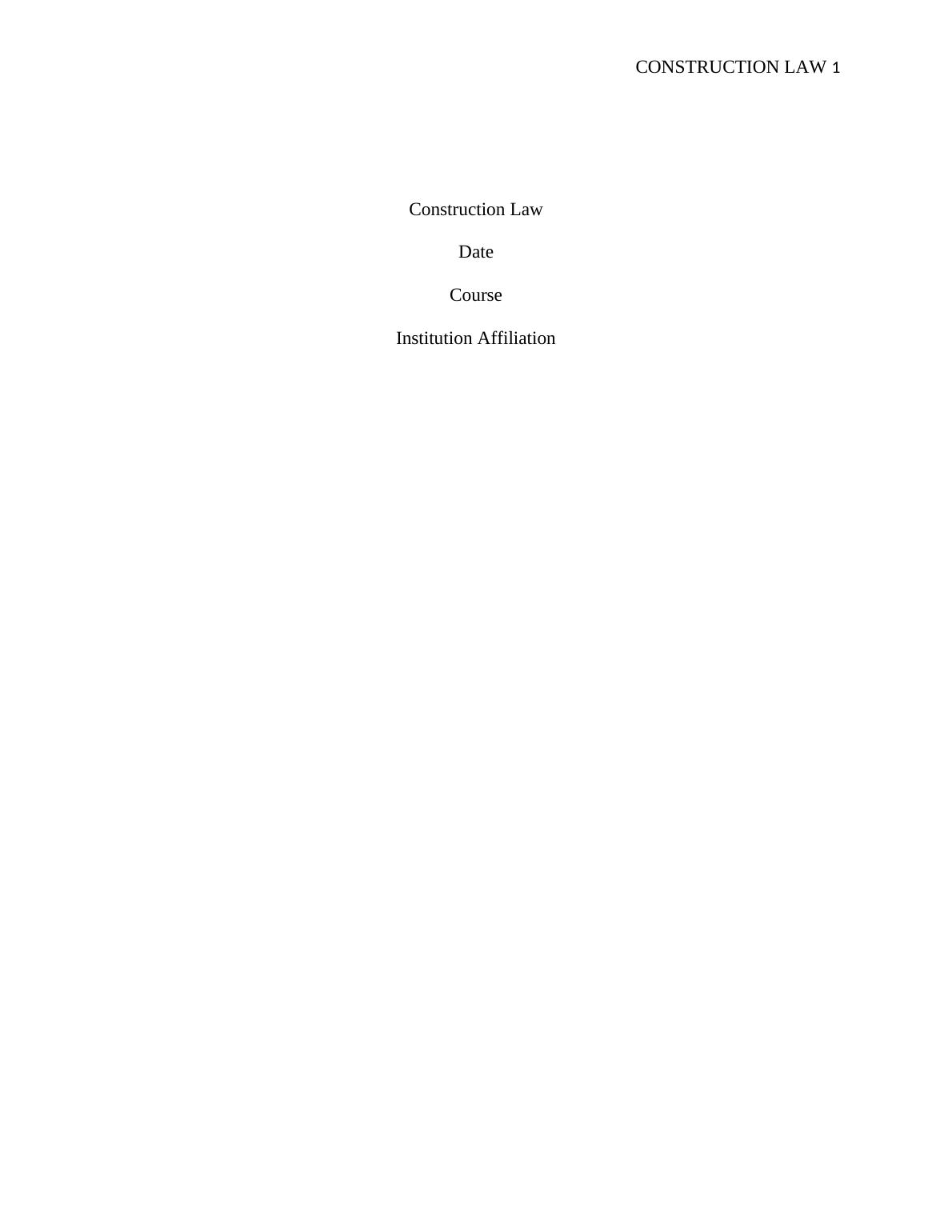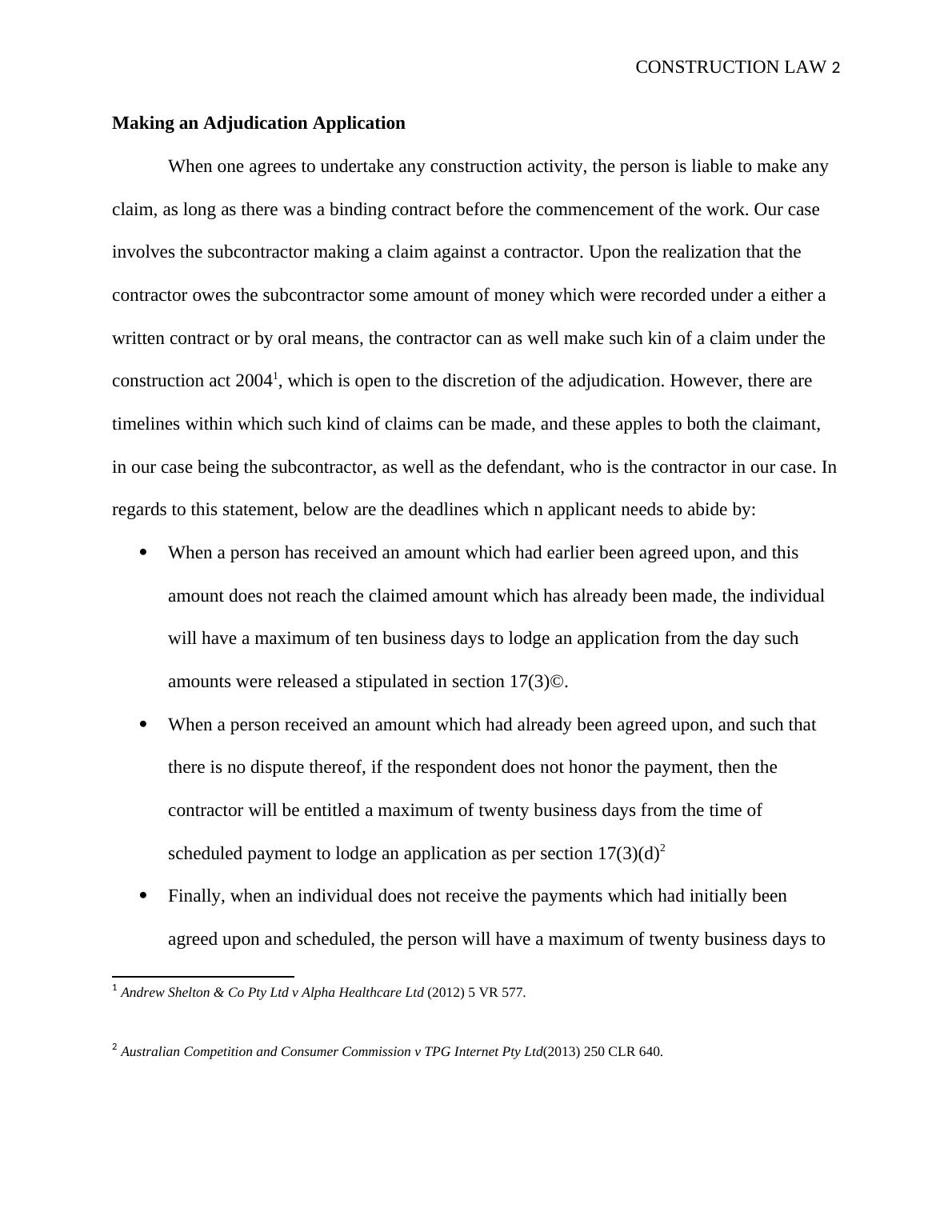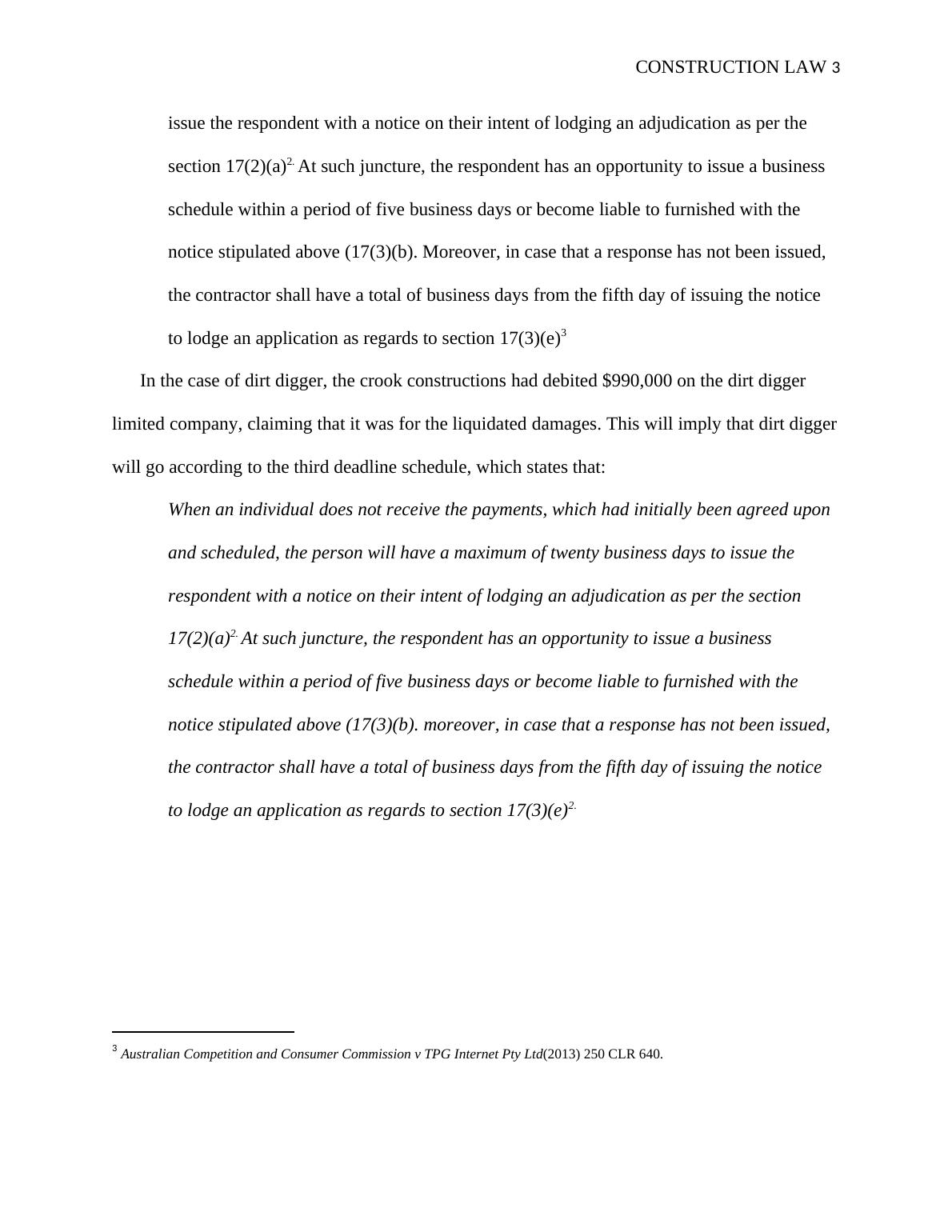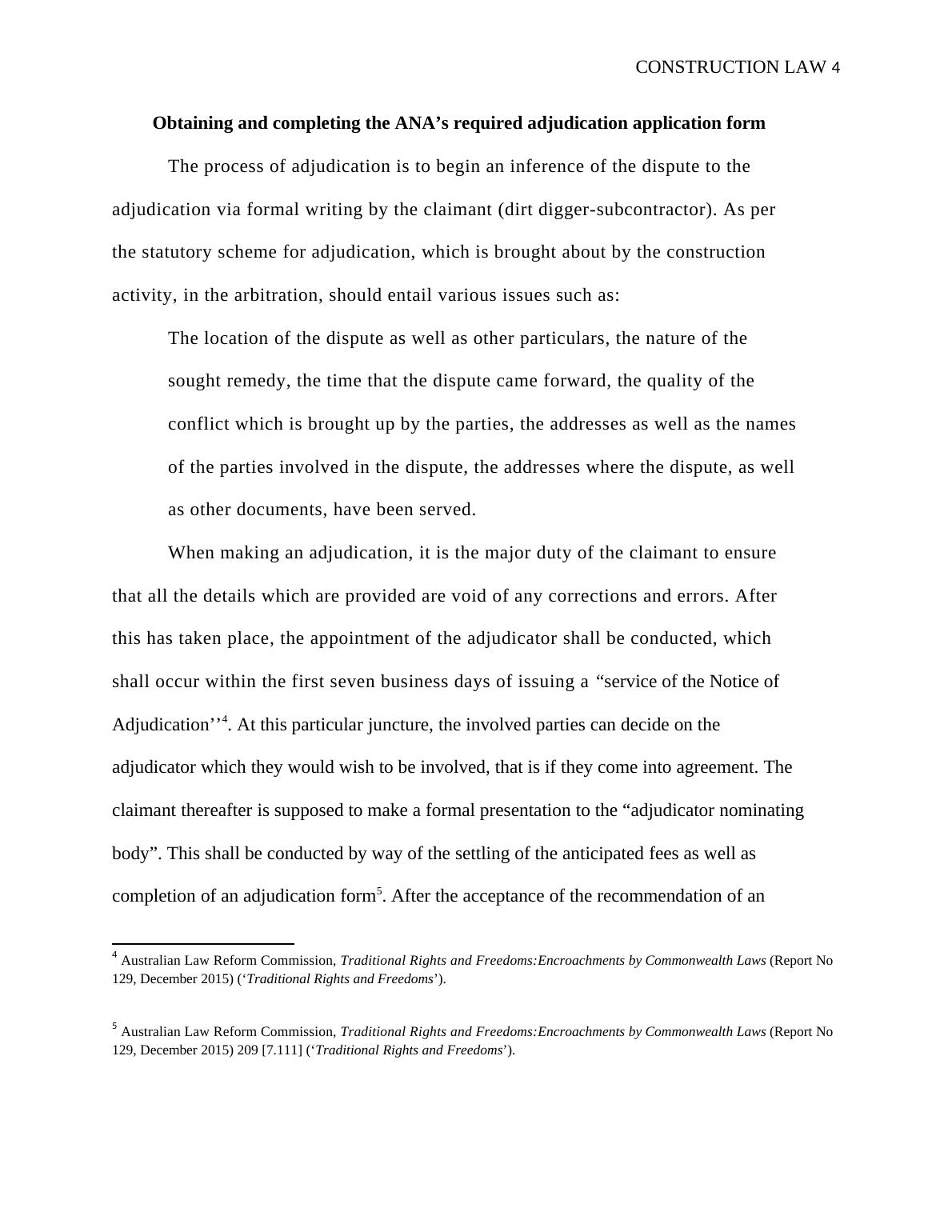Making an Adjudication Application in Construction Law
Added on 2022-12-18
20 Pages4595 Words51 Views
CONSTRUCTION LAW 1
Construction Law
Date
Course
Institution Affiliation
Construction Law
Date
Course
Institution Affiliation

CONSTRUCTION LAW 2
Making an Adjudication Application
When one agrees to undertake any construction activity, the person is liable to make any
claim, as long as there was a binding contract before the commencement of the work. Our case
involves the subcontractor making a claim against a contractor. Upon the realization that the
contractor owes the subcontractor some amount of money which were recorded under a either a
written contract or by oral means, the contractor can as well make such kin of a claim under the
construction act 20041, which is open to the discretion of the adjudication. However, there are
timelines within which such kind of claims can be made, and these apples to both the claimant,
in our case being the subcontractor, as well as the defendant, who is the contractor in our case. In
regards to this statement, below are the deadlines which n applicant needs to abide by:
When a person has received an amount which had earlier been agreed upon, and this
amount does not reach the claimed amount which has already been made, the individual
will have a maximum of ten business days to lodge an application from the day such
amounts were released a stipulated in section 17(3)©.
When a person received an amount which had already been agreed upon, and such that
there is no dispute thereof, if the respondent does not honor the payment, then the
contractor will be entitled a maximum of twenty business days from the time of
scheduled payment to lodge an application as per section 17(3)(d)2
Finally, when an individual does not receive the payments which had initially been
agreed upon and scheduled, the person will have a maximum of twenty business days to
1 Andrew Shelton & Co Pty Ltd v Alpha Healthcare Ltd (2012) 5 VR 577.
2 Australian Competition and Consumer Commission v TPG Internet Pty Ltd(2013) 250 CLR 640.
Making an Adjudication Application
When one agrees to undertake any construction activity, the person is liable to make any
claim, as long as there was a binding contract before the commencement of the work. Our case
involves the subcontractor making a claim against a contractor. Upon the realization that the
contractor owes the subcontractor some amount of money which were recorded under a either a
written contract or by oral means, the contractor can as well make such kin of a claim under the
construction act 20041, which is open to the discretion of the adjudication. However, there are
timelines within which such kind of claims can be made, and these apples to both the claimant,
in our case being the subcontractor, as well as the defendant, who is the contractor in our case. In
regards to this statement, below are the deadlines which n applicant needs to abide by:
When a person has received an amount which had earlier been agreed upon, and this
amount does not reach the claimed amount which has already been made, the individual
will have a maximum of ten business days to lodge an application from the day such
amounts were released a stipulated in section 17(3)©.
When a person received an amount which had already been agreed upon, and such that
there is no dispute thereof, if the respondent does not honor the payment, then the
contractor will be entitled a maximum of twenty business days from the time of
scheduled payment to lodge an application as per section 17(3)(d)2
Finally, when an individual does not receive the payments which had initially been
agreed upon and scheduled, the person will have a maximum of twenty business days to
1 Andrew Shelton & Co Pty Ltd v Alpha Healthcare Ltd (2012) 5 VR 577.
2 Australian Competition and Consumer Commission v TPG Internet Pty Ltd(2013) 250 CLR 640.

CONSTRUCTION LAW 3
issue the respondent with a notice on their intent of lodging an adjudication as per the
section 17(2)(a)2. At such juncture, the respondent has an opportunity to issue a business
schedule within a period of five business days or become liable to furnished with the
notice stipulated above (17(3)(b). Moreover, in case that a response has not been issued,
the contractor shall have a total of business days from the fifth day of issuing the notice
to lodge an application as regards to section 17(3)(e)3
In the case of dirt digger, the crook constructions had debited $990,000 on the dirt digger
limited company, claiming that it was for the liquidated damages. This will imply that dirt digger
will go according to the third deadline schedule, which states that:
When an individual does not receive the payments, which had initially been agreed upon
and scheduled, the person will have a maximum of twenty business days to issue the
respondent with a notice on their intent of lodging an adjudication as per the section
17(2)(a)2. At such juncture, the respondent has an opportunity to issue a business
schedule within a period of five business days or become liable to furnished with the
notice stipulated above (17(3)(b). moreover, in case that a response has not been issued,
the contractor shall have a total of business days from the fifth day of issuing the notice
to lodge an application as regards to section 17(3)(e)2.
3 Australian Competition and Consumer Commission v TPG Internet Pty Ltd(2013) 250 CLR 640.
issue the respondent with a notice on their intent of lodging an adjudication as per the
section 17(2)(a)2. At such juncture, the respondent has an opportunity to issue a business
schedule within a period of five business days or become liable to furnished with the
notice stipulated above (17(3)(b). Moreover, in case that a response has not been issued,
the contractor shall have a total of business days from the fifth day of issuing the notice
to lodge an application as regards to section 17(3)(e)3
In the case of dirt digger, the crook constructions had debited $990,000 on the dirt digger
limited company, claiming that it was for the liquidated damages. This will imply that dirt digger
will go according to the third deadline schedule, which states that:
When an individual does not receive the payments, which had initially been agreed upon
and scheduled, the person will have a maximum of twenty business days to issue the
respondent with a notice on their intent of lodging an adjudication as per the section
17(2)(a)2. At such juncture, the respondent has an opportunity to issue a business
schedule within a period of five business days or become liable to furnished with the
notice stipulated above (17(3)(b). moreover, in case that a response has not been issued,
the contractor shall have a total of business days from the fifth day of issuing the notice
to lodge an application as regards to section 17(3)(e)2.
3 Australian Competition and Consumer Commission v TPG Internet Pty Ltd(2013) 250 CLR 640.

CONSTRUCTION LAW 4
Obtaining and completing the ANA’s required adjudication application form
The process of adjudication is to begin an inference of the dispute to the
adjudication via formal writing by the claimant (dirt digger-subcontractor). As per
the statutory scheme for adjudication, which is brought about by the construction
activity, in the arbitration, should entail various issues such as:
The location of the dispute as well as other particulars, the nature of the
sought remedy, the time that the dispute came forward, the quality of the
conflict which is brought up by the parties, the addresses as well as the names
of the parties involved in the dispute, the addresses where the dispute, as well
as other documents, have been served.
When making an adjudication, it is the major duty of the claimant to ensure
that all the details which are provided are void of any corrections and errors. After
this has taken place, the appointment of the adjudicator shall be conducted, which
shall occur within the first seven business days of issuing a “service of the Notice of
Adjudication’’4. At this particular juncture, the involved parties can decide on the
adjudicator which they would wish to be involved, that is if they come into agreement. The
claimant thereafter is supposed to make a formal presentation to the “adjudicator nominating
body”. This shall be conducted by way of the settling of the anticipated fees as well as
completion of an adjudication form5. After the acceptance of the recommendation of an
4 Australian Law Reform Commission, Traditional Rights and Freedoms:Encroachments by Commonwealth Laws (Report No
129, December 2015) (‘Traditional Rights and Freedoms’).
5 Australian Law Reform Commission, Traditional Rights and Freedoms:Encroachments by Commonwealth Laws (Report No
129, December 2015) 209 [7.111] (‘Traditional Rights and Freedoms’).
Obtaining and completing the ANA’s required adjudication application form
The process of adjudication is to begin an inference of the dispute to the
adjudication via formal writing by the claimant (dirt digger-subcontractor). As per
the statutory scheme for adjudication, which is brought about by the construction
activity, in the arbitration, should entail various issues such as:
The location of the dispute as well as other particulars, the nature of the
sought remedy, the time that the dispute came forward, the quality of the
conflict which is brought up by the parties, the addresses as well as the names
of the parties involved in the dispute, the addresses where the dispute, as well
as other documents, have been served.
When making an adjudication, it is the major duty of the claimant to ensure
that all the details which are provided are void of any corrections and errors. After
this has taken place, the appointment of the adjudicator shall be conducted, which
shall occur within the first seven business days of issuing a “service of the Notice of
Adjudication’’4. At this particular juncture, the involved parties can decide on the
adjudicator which they would wish to be involved, that is if they come into agreement. The
claimant thereafter is supposed to make a formal presentation to the “adjudicator nominating
body”. This shall be conducted by way of the settling of the anticipated fees as well as
completion of an adjudication form5. After the acceptance of the recommendation of an
4 Australian Law Reform Commission, Traditional Rights and Freedoms:Encroachments by Commonwealth Laws (Report No
129, December 2015) (‘Traditional Rights and Freedoms’).
5 Australian Law Reform Commission, Traditional Rights and Freedoms:Encroachments by Commonwealth Laws (Report No
129, December 2015) 209 [7.111] (‘Traditional Rights and Freedoms’).

End of preview
Want to access all the pages? Upload your documents or become a member.
Related Documents
Advice on Making an Adjudication Applicationlg...
|19
|4512
|146
Adjudication Applicationlg...
|4
|785
|51
Security of Payments Act: Business and Construction Industry Security of Payments Act, 1999lg...
|15
|3350
|489
Amendment of the Building and Construction Industry Security of Payments Act 1999lg...
|13
|3704
|398
Building and Construction Industry Security of Payment Act 1999 No 46lg...
|11
|2373
|374
Building and Construction Industry Security of Payment Act 1999 - Deskliblg...
|9
|2526
|258